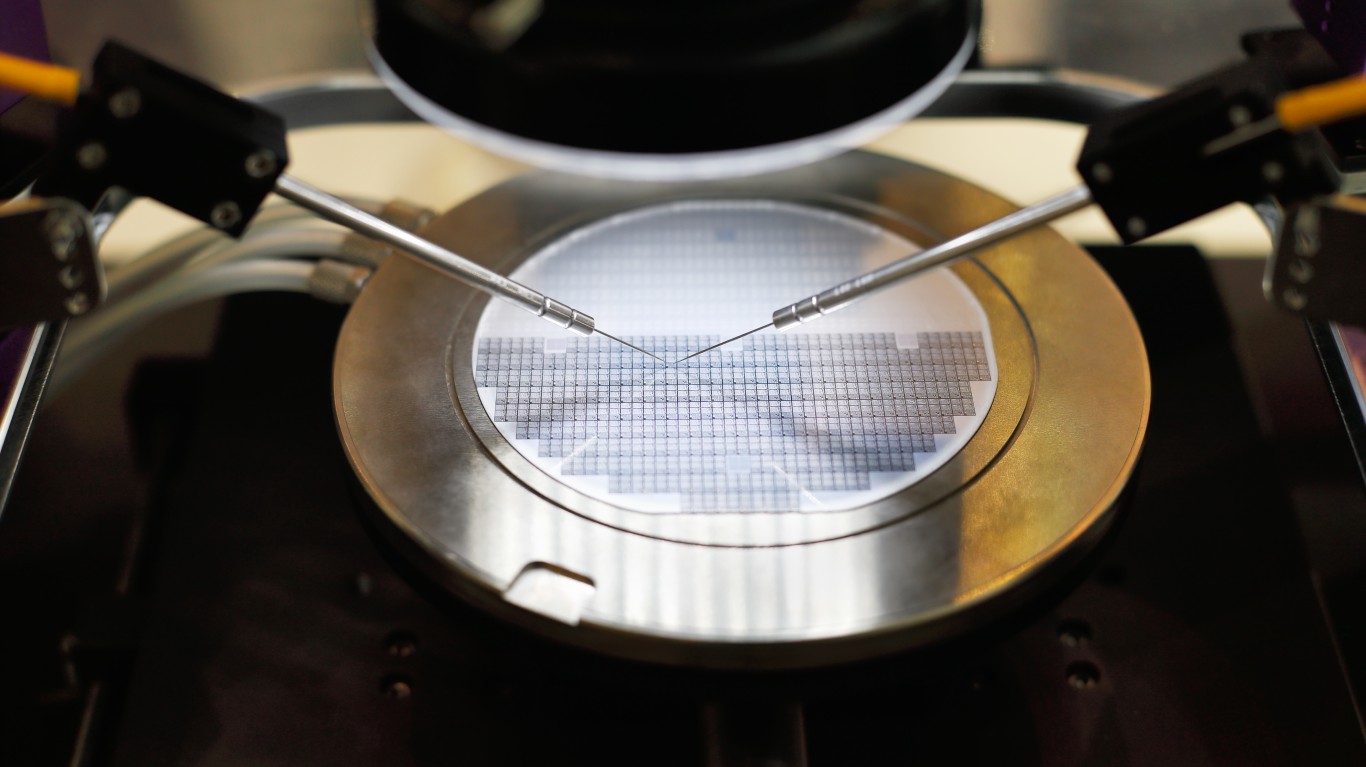Technology
Taiwan Semiconductor's $25 Billion+ 2021 Capex a Boon for These 5 Suppliers

Published:

Chip manufacturer Taiwan Semiconductor Manufacturing Co. (NYSE: TSM), aka TSMC, reported fourth-quarter and full-year 2020 results early Thursday morning. Full-year revenue was up more than 31% to $45.51 billion, and gross margin was up by 710 basis points to 53.1%. Earnings per share rose by 50% to NT$19.97 (US$0.70 at an exchange rate of NT$28.52 to US$1.00).
A key number in the annual results is the company’s capital spending. TSMC reported capex last year of about $17.8 billion and forecast spending in 2021 in the range of $25 billion to $28 billion. Operating cash flow in 2020 totaled $28.8 billion, and free cash flow totaled about $11.1 billion. In other words, TSMC can pay cash for investing in its future and still have a nice pile left that it could share with investors.
Compare TSMC’s planned level of spending this year with planned spending in a capital intensive industry like oil and gas production. Exxon Mobil already has said it plans capex in the range of $16 billion to $19 billion in 2021, and Chevron has set a target of around $14 billion.
The suppliers that will benefit from TSMC’s capital spending are semiconductor equipment makers like Applied Materials Inc. (NASDAQ: AMAT), Lam Research Corp. (NASDAQ: LRCX) and KLA Corp. (NASDAQ: KLAC), among others. We reviewed a half-dozen semiconductor capital equipment stocks late last month following a sector review by analysts at Needham. Given TSMC’s plans for this year, that review is worth an update.
ASML Holding N.V. (NASDAQ: ASML) is based in the Netherlands and is the largest company by market cap ($216.4 billion) in this group. It makes extreme ultraviolet (EUV) systems and has reportedly received an order for 13 from TSMC for delivery in 2021.
Since December 29, ASML’s stock has added more than 6% to its share price, and it traded at a new 52-week high of around $536 shortly after Thursday’s opening bell. The stock’s 52-week low is $191.25, and the consensus price target on the shares is $438.11. ASML pays a dividend yield of 0.56% ($2.85 annually), and the company’s stock price jumped more than 66% in 2020.
Applied Materials makes and sells a variety of manufacturing systems used to make semiconductor chips. More than half the company’s sales are to chip foundries (fabs), with the remaining 44% divided equally between memory chip and flash memory makers.
Shares added 16.4% since the end of December and more than 43% in 2020. Shares posted a new 52-week high of nearly $105 in the first few minutes of Thursday’s trading session, about $9 above the consensus price target of $95.96 and nearly 7% higher than Wednesday’s closing price. The stock trades at around 21 times expected 2021 earnings. The company pays an annual dividend of $0.88 (yield of 0.90%).
Since December 29, Lam Research shares have added more than 11%, and in 2020 the stock gained 64%. Thursday morning, the stock has added around 5% and posted a new 52-week high of nearly $554, against a consensus price target of $484.17. Shares trade at around 25 times expected 2021 earnings. Lam Research pays a dividend yield of about 1% ($5.20 annually).
KLA manufactures and services process control systems. More than half the company’s revenue is derived from sales to chip fabs like TSMC.
In the two weeks since our last report on these stocks, KLA shares have added just over 14% to close 2020 with a full-year share price increase of around 48%. The stock traded up more than 7% early Thursday, after posting a new 52-week high of $313.98, compared to a price target of $265.47. The stock trades at around 25 times expected 2021 earnings, and KLA pays an annual dividend of $3.60 (yield of 1.24%).
Teradyne Inc. (NASDAQ: TER) develops and sells automatic semiconductor test equipment around the world. Sales totaled $2.3 billion in the 2019 fiscal year, and the company’s market cap is just north of $23 billion.
Since our review in late December, Teradyne stock has added just over 16% to its price, and it posted a full-year jump of nearly 77% to its share price. Early Thursday, the shares traded at a high of $139.18, just 35 cents from the 52-week high posted on Tuesday. The stock trades at around 29 times expected 2021 earnings and pays an annual dividend of $0.40 (yield of 0.29%).
ASE Technology Holding Co. Ltd. (NYSE: ASX) is a Taiwan-based provider of semiconductor manufacturing services, including packaging and testing. ASE is well-positioned to take advantage of a total spend of around $3.4 billion this year on assembly and packaging equipment and estimated spending of $5.7 billion on testing next year.
Since late December, shares have added more than 24%, which boosted the company’s full-year appreciation to just 7%. The stock has posted a new 52-week high of $7.34 early Thursday, a gain of about 3% over Wednesday’s closing price. The consensus price target on the shares is $6.43, and the stock trades at about 17 times expected 2021 earnings. ASE pays a dividend yield of 1.91% (payment of $0.14 annually).
If you missed out on NVIDIA’s historic run, your chance to see life-changing profits from AI isn’t over.
The 24/7 Wall Street Analyst who first called NVIDIA’s AI-fueled rise in 2009 just published a brand-new research report named “The Next NVIDIA.”
Click here to download your FREE copy.
Thank you for reading! Have some feedback for us?
Contact the 24/7 Wall St. editorial team.